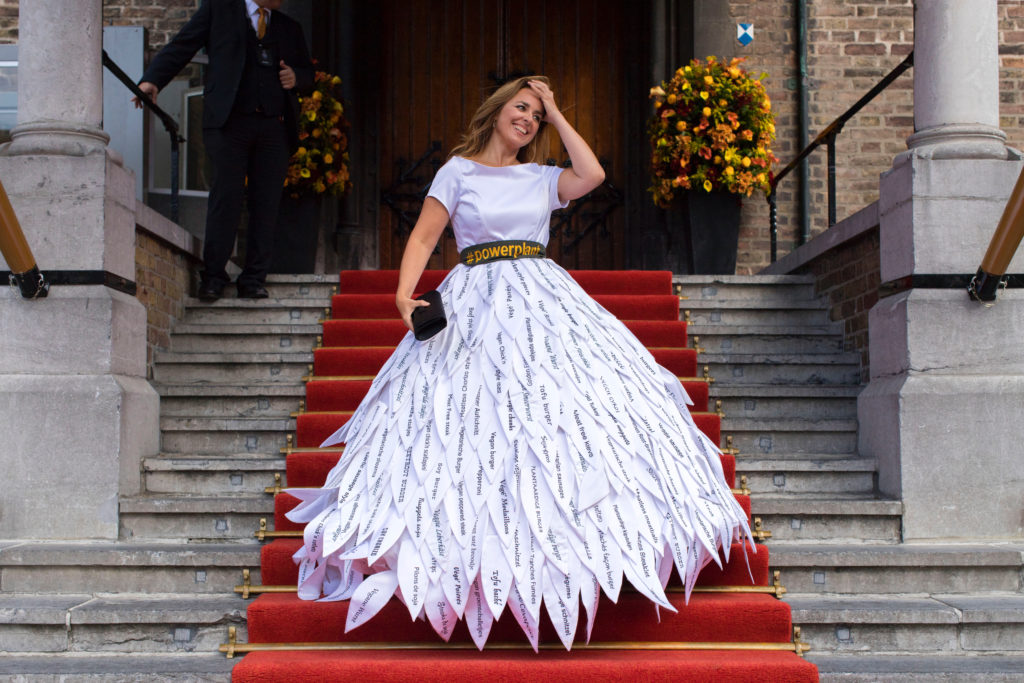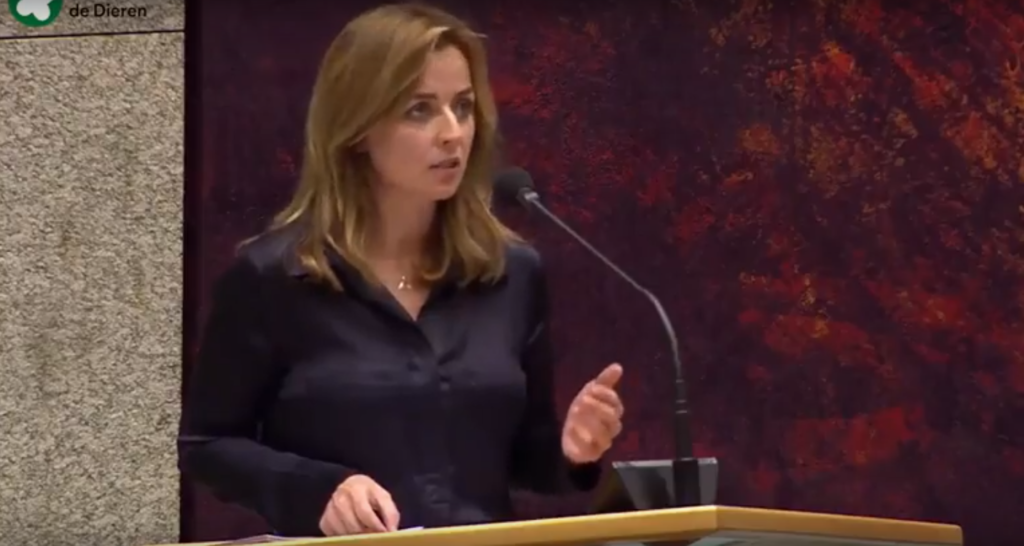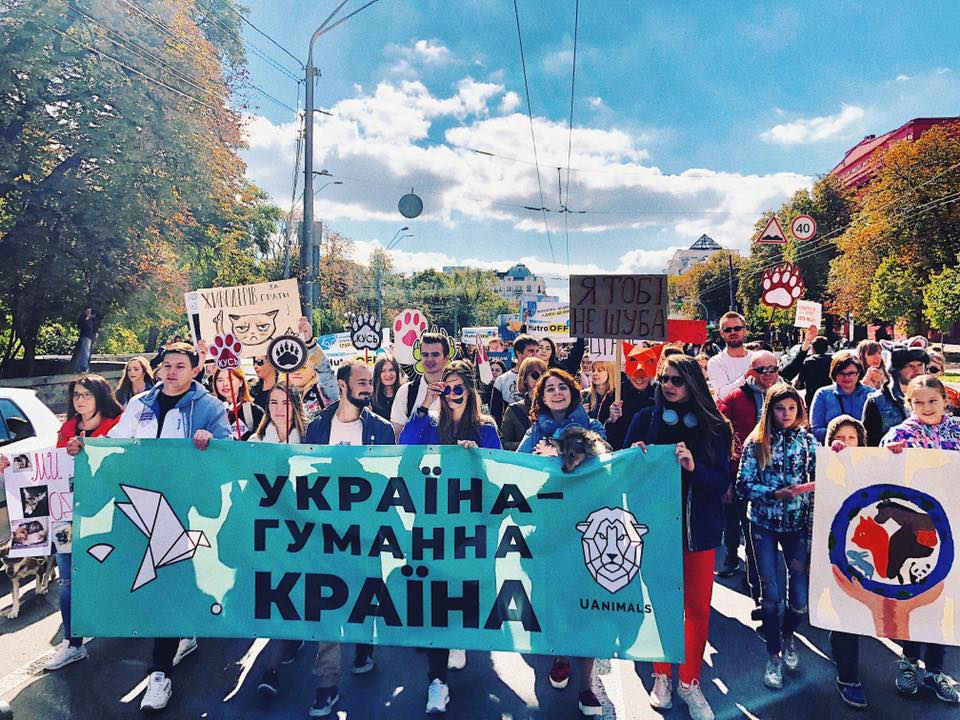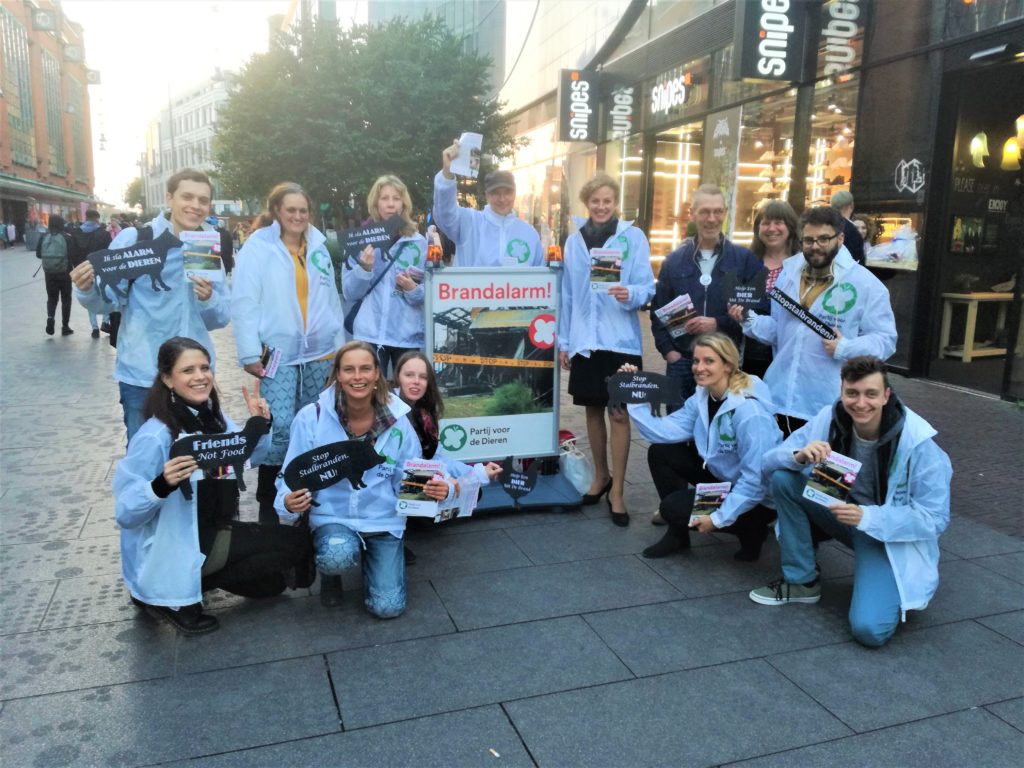Worldlog Marianne Thieme 9 oktober 2018
This year was the tenth time in a row we used Prinsjesdag, the most important political event in the Netherlands, to make a political statement. On Prinsjesdag, which is held every year on the third Tuesday of September, the Dutch government presents its plans for the upcoming parliamentary year. It’s customary for participants to dress in suits and fancy dresses on this day, but we want our outfits to also carry an important message.

Marianne in her ‘Vegetarian Meat Dress’ on Prinsjesdag. The dress was designed by Yasmina Ajbilou, who focuses on zero waste fashion.
I wore a dress carrying all imaginable names of vegan and vegetarian meat products currently on the market in Europe – now that I was still allowed to. Worldwide, lobbyists for the meat industry are looking for ways to remove plant-based meat substitutes from the market or make the names of the products illegal. The last convulsions of the meat industry, which clearly feels the market of cruelty-free products breathing down its neck.
The waistband of the dress carries the name of our new documentary, Powerplant. And I can hereby tell you that filming has been completed! The documentary is about the transition to a plant-based and animal-friendly society and will be released at the beginning of 2019. Around the same time, my new book on idealistic politics will be published. I cannot wait to share all this with you!
After Prinsjesdag, the state budget was discussed in the Dutch Lower House. The government’s explanatory notes on the budget, mainly consisting of self-satisfied political propaganda, proved a missed opportunity. The government congratulated itself on irrelevant figures while passing down the truly important matters, such as a strong and honest environmental policy, to other parties. Why not use the tax reform to give carbon emission its real price? Why not use the VAT increase to make sustainable consumption cheaper and non-sustainable consumption more expensive? Instead of having large companies pay to make the Netherlands sustainable, it is now mainly the citizens that are forced to cover the costs.

Our government has passed down the bill to our children and grandchildren. It has made sustainability the responsibility of companies and social organisations, and it has shied away from legal sanctions. It has been three years since Paris, and we are still making our decisions together with companies, gradually losing sight of our goals. Allowing large companies to take part in the decision-making on laws and regulations that might well increase their costs is never going to work; just as you would not allow an offender to decide on the severity of their own punishment. The same goes for agricultural policies.
Agriculture, specifically livestock farming, is facing major problems: agricultural toxins, ammonia, particular matter, soil contamination, animal suffering, food scandals. More and more experts are saying we will not achieve our climate targets unless we radically reduce livestock numbers, which inevitably means a reduction of the consumption of animal products. And the longer we wait, the more difficult and more expensive it will be for farmers to make the transition. But what does the government do? It continues to seek its salvation in so-called innovation, allowing every opportunity for further intensification and expansion. The subject of reducing livestock numbers is carefully avoided. Narrow economic interests weigh more heavily than human and animal welfare.


Pictures of animal rights protests in Turkey and Ukraine
It is so good to see that, despite the meat industry lobbyists, the animal rights movement is growing on a global scale. For example, a march for animals was organised by Ukrainian animal rights organisation UAnimals in 20 different Ukrainian cities. It was a huge success: in the capital Kiev alone, more than 6,000 people joined the march. On Buyukada, the largest island of Turkey, a protest was organised against animal suffering and the tourist horse-drawn carriages. Last Sunday, many people participated in a Vegan March in Istanbul in order to raise awareness about the great injustice we inflict on animals.
Our sister parties are also very successful. Thanks to our Spanish sister party PACMA, 100,000 people in Madrid took to the streets to demonstrate against the cruel practice of bullfighting. Last week, our Portuguese sister party PAN ensured that the tax exemption for bullfighters will most likely be abolished. As of next year, bullfighters will have to pay taxes just like any other citizen. An important step towards a ban on bullfighting in Portugal.

On World Animal Day, the Party for the Animals draws attention to the farm fires killing hundreds of thousands of animals every year
Last week it was World Animal Day. In several cities in the Netherlands, the Party for the Animals drew attention to the hundreds of thousands of animals burnt alive each year in farm fires. The reason that this is still happening in the Netherlands is purely a political one: a majority of the Lower House systematically votes against stricter fire safety regulations. At the moment, toilet paper is better protected from fire than animals. Unbelievable.
The future is plant-based, and this vegan woman of 96 knows it. An inspiration to us all.
Kind regards,
Marianne
Voor de tiende keer op rij hebben we de belangrijkste politieke traditie van Nederland, de Prinsjesdag, aangegrepen om een statement te maken. Op Prinsjesdag (elke derde dinsdag van september) presenteert de Nederlandse regering haar plannen voor het komende parlementaire jaar. Het is dan gebruikelijk dat iedereen in mooie jurken en pakken verschijnt. Wij kiezen voor outfits met een belangrijke boodschap.

Marianne in haar ‘Vega Vleesjurk’ tijdens Prinsjesdag. De jurk is ontworpen door Yasmina Ajbilou, die zich richt op zero-waste fashion.
Ik droeg een jurk die voorzien was van alle denkbare namen van vegan en vegetarische vleesproducten zoals die op dit moment van verschillende aanbieders in heel Europa te koop zijn. Nu het nog kan. Want wereldwijd roepen lobbyisten van de vleesindustrie op om plantaardige vleesvervangers te dwarsbomen of de naamgeving ervan strafbaar te maken. De laatste stuiptrekkingen van de vleesindustrie, die duidelijk de hete adem van producten zonder dierenleed in haar nek voelt.
Op de tailleband van de jurk staat de naam van onze nieuwe documentaire: Powerplant. De documentaire gaat over de transitie naar een meer plantaardige en diervriendelijke samenleving en verschijnt begin 2019. Ik heb alle opnames voor de documentaire net achter de rug. Rond die tijd verschijnt ook mijn nieuwe boek over idealistische politiek. Ik kan niet wachten om dat allemaal met jullie te delen!
Na Prinsjesdag werd de Rijksbegroting behandeld in de Tweede Kamer. De toelichting van de regering op de begroting was vooral zelfgenoegzame politieke propaganda en bovenal een gemiste kans. Het kabinet feliciteert zichzelf met irrelevante cijfers en schuift wat echt belangrijk is, namelijk een sterk en eerlijk milieubeleid, door en af. Waarom wordt de belastinghervorming niet gebruikt om CO2-emissies hun echte prijs te geven? Waarom wordt de verhoging van de btw niet gebruikt om duurzame consumptie goedkoper te maken en niet-duurzame consumptie duurder? In plaats van het grootbedrijf mee te laten betalen aan het verduurzamen van Nederland, draaien nu vooral de burgers op voor de kosten.

Het kabinet schuift de rekening door naar onze (klein)kinderen. Het legt de verantwoordelijkheid voor duurzaamheid bij het bedrijfsleven en maatschappelijke organisaties en deinst terug voor wettelijke sancties. Waardoor we drie jaar na Parijs nog altijd aan het polderen zijn en de doelen steeds verder uit zicht raken. Het grootbedrijf mee laten beslissen over wetten en regels die hun kosten verhogen, gaat niet werken: je laat een overtreder ook niet meebeslissen over de hoogte van zijn straf. Hetzelfde geldt voor het landbouwbeleid.
De landbouw, en de veehouderij in het bijzonder, kampt met grote problemen: landbouwgif, ammoniak, fijnstof, bodemvervuiling, dierenleed en voedselschandalen. Steeds meer experts stellen dat we de klimaatdoelstellingen niet halen zonder radicale inkrimping van onze veestapel. Dat daarom een beperking van de consumptie van dierlijke producten noodzakelijk is. En hoe langer we wachten, hoe moeilijker en duurder het wordt voor boeren om om te schakelen. Wat doet het kabinet? Het blijft zijn heil zoeken in zogenaamde innovatie en geeft alle ruimte voor verdere intensivering en schaalvergroting. Inkrimping van de veestapel wordt angstvallig vermeden. Kortzichtige economische belangen wegen zwaarder dan het welzijn van dieren en mensen.


Foto’s van dierenrechtenprotesten in Turkije en Oekraïne
Mooi om te zien dat ondanks de vleeslobby de dierenrechtenbeweging wereldwijd groeit. Zo organiseerde de Oekraïense dierenrechtenorganisatie UAnimals een mars voor dieren in 20 Oekraïense steden. Een groot succes: alleen al in hoofdstad Kiev liepen meer dan 6000 mensen mee. Ook op Buyukada, het grootste Turkse eiland, vond een protest plaats tegen dierenleed en (toeristische) paardenkoetsen. Afgelopen zondag deden velen in Istanbul mee aan een Vegan Mars, om aandacht te vragen voor het grote onrecht dat we dieren aandoen.
Onze zusterpartijen boeken ook successen. Zo kreeg onze Spaanse zusterpartij PACMA weer 100.000 mensen op de been in Madrid om te demonstreren tegen het wrede stierenvechten. Onze Portugese zusterpartij PAN heeft er vorige week voor gezorgd dat de belastinguitzondering voor stierenvechters hoogstwaarschijnlijk wordt afgeschaft. Stierenvechters moeten vanaf volgend jaar zoals elke andere burger gewoon belasting gaan betalen. Een belangrijke stap op weg naar een verbod op stierenvechten in Portugal.

Partij voor de Dieren vraagt op Wereld Dierendag aandacht voor honderdduizenden dieren die jaarlijks omkomen bij stalbranden
Vorige week was het Wereld Dierendag. De Partij voor de Dieren heeft op verschillende plekken in Nederland aandacht gevraagd voor de honderdduizenden dieren die elk jaar levend verbranden bij stalbranden. Dat dit nog steeds in Nederland gebeurt is een pure politieke keuze: een meerderheid van de Tweede Kamer stemt steeds tegen strengere brandveiligheidsregels. Nu wordt toiletpapier in Nederland beter beschermd tegen brand dan dieren. Onbegrijpelijk.
De toekomst is plantaardig. Dat weet ook deze vegan vrouw van 96. Mooie inspiratie voor ons allemaal.
Groet!
Marianne